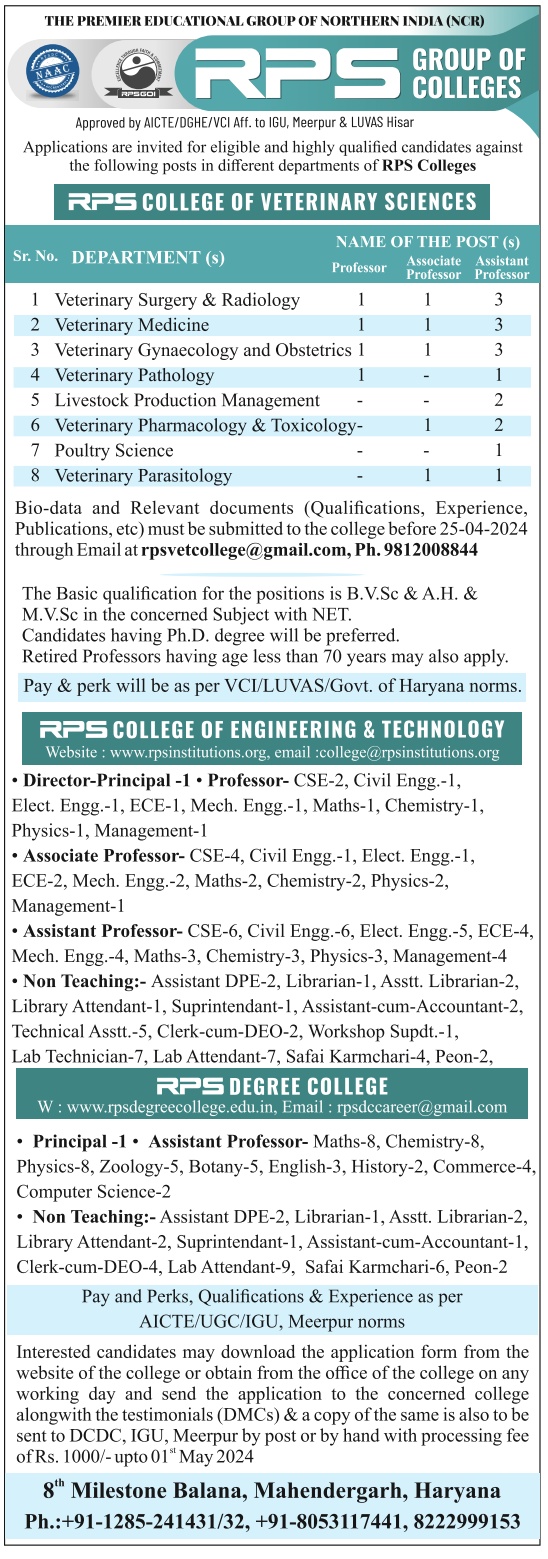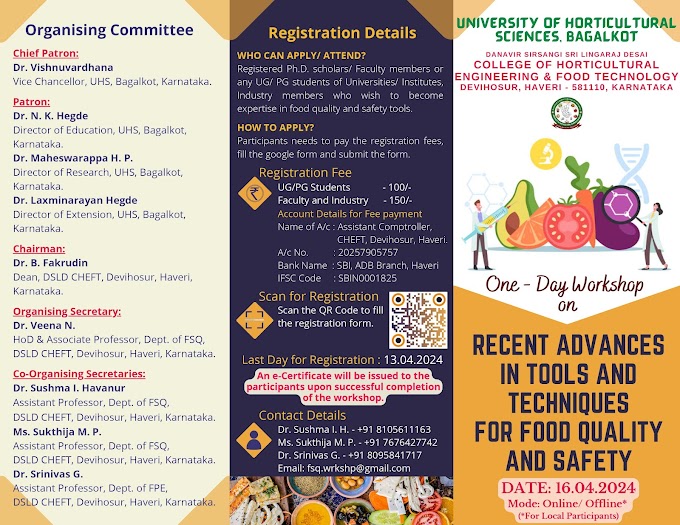Admission into Ph.D. Programme
Indian Institute of Technology Bhubaneswar invites application for admission to Ph.D. Programme from candidates in the following categories:
(1) Institute Scholar (2) Sponsored Scholar (3) Project Scholar (Projects running at IIT Bhubaneswar)
Opening date for online application : 5th October 2015
Last date for submission of online application: 4th November 2015 12:00 Midnight
Click here for New Registration Click here to Login (if already registered)
1) School of Basic Sciences:
Biosciences
Biophysical Chemistry: Protein Chemistry & Spectroscopy, Structure-Function Elucidation of Various Small Heat Shock Proteins Related to Different Diseases (Cataract, Leprosy and Tuberculosis); Biochemistry, Enzymology, G-protein Coupled Receptors & Signal Transduction, Chemical and Cellular Biology, Peptide/Protein Design & Engineering, Computational Biology.
Chemistry
Coordination Aspects of Homo and Heterometallic Complexes; Metal Based Drug Design, Nanoparticle Based Sensors; Magneto Chemistry of Grid Complexes and Coordination Polymers, Bioinorganic Perspective of Coordination Complexes, Fluorescent Chemosensors, Coordination Complexes as Contrast Agent for MRI; Carbohydrate Chemistry, Synthetic Methods Development, Bioactive Natural and Unnatural Products Synthesis; Supramolecular Chemistry, Molecular Recognition; Metal-Organic and Covalent Open Frame (MOF and COF) Compounds; Biophysical Chemistry: Protein Chemistry & Spectroscopy, Structure-Function Elucidation of Various Small Heat Shock Proteins Related to Different Diseases (Cataract, Leprosy and Tuberculosis); Organometallic, Homogenous Catalysis, Green Chemistry; Theoretical Chemistry, Development of Theoretical and Computational Methods with Application to Electronic Structure, Electron-atom/ molecule Scattering Processes, and Electronically 'nonadiabatic' Effects and Dynamics.
Physics
Experimental Atomic-Molecular-Surface Physics; Nanophotonics, Plasmonics and Fiber Sensors; Large Scale Quantum Simulations of Nanostructures, Quantum Transport in Graphene and 2-Dimensional Layered Structures, Quantum Mechanics and Molecular Mechanics Modeling of Biological Systems, Biophysics; Nanomagnetism, Weyl Semimetal, Magnetic thin films and multilayers; Energy storage devices, Biosensors; Quantum Dissipation & Decoherence; Experimental High Energy Physics; Quantum Field Theory, String Theory and Black Holes.
Mathematics
Queueing Theory, Stochastic models, Applied Probability, Control of Queues, Complex Dynamics and Fractals, Soft Computing, Optimization Theory, Numerical Methods & Computational Fluid dynamics, Combinational Matrix Theory, Spectral Graph Theory
2) School of Earth, Ocean & Climate Sciences:
Geo-Science
Paleoceanography and Paleoclimatology, Geochemistry, Environmental and Aqueous Geochemistry, Hydrogeology, Groundwater Modelling, Active Source Seismics, Neo-Tectonics of Eastern Ghat Mobile Belt.
Climate Science
Atmospheric Aerosols and Climate, Air-Sea Interactions and Climate Change, Tropical Meteorology, Monsoon Dynamics, Observations, Assimilation and Modeling of extreme weather events, Physical and Satellite Oceanography, Ocean Modeling.
3) School of Electrical Sciences:
Computer Science
Human computer interface, Computer vision, Network & system security, Cloud computing and analytics, Software testing and verification.
Electronics and Communication Engineering
Optical communication, Fiber wireless (FiWi) networks, Antenna design, Radar systems, Microwave and Wireless communication, Sensor networks, Digital Signal processing, Soft and evolutionary computing, Intelligent instrumentation, Cognitive radio, Semiconductor Devices, Biomedical Signal Processing, Medical Imaging, VLSI signal processing.
Electrical Engineering
Power transmission and distribution protection, Smart grid technologies, protection and security, PMU, wide area monitoring and application, Renewable energy, Power systems and Power electronics drives.
4) School of Humanities, Social Sciences and Management:
Economics
Open macroeconomics and Natural Resource Economics. Environmental Economics, Natural Resource Management and Climate Change and Rural Development, Mining Economics, Financial Management, Health Economics
English
Commonwealth Studies, Indian Diaspora Literature, Travel Writings/Autobiographies/Memoirs, Indian Writing in English. Postcolonial World Literature, Native North American Literature, Indigenous Literature Written in English, Indian Writing in English, ELT, Cross-cultural Communication, Business Communication.
Psychology
Psycholinguistics, Cognitive Psychology, Cognitive Neuroscience, Neurolinguistics, Positive Psychology and Psychology of Personality, Clinical Psychology, Consumer Behaviour, Cyber psychology (online Behaviour)
5) School of Infrastructure (Civil Engineering):
Vegetated flows, Fluvial hydraulics, Fluid-structure interaction, Offshore structures, Earthquake engineering, Structural dynamics, Buried pipelines, Inelastic seismic behavior of structures, Seismic behavior of non-engineered structures, Soil-structure interaction, Dynamics of soils and foundations, Energy geotechnics, Environmental geotechnics, Expansive soils, Public transportation system and traffic network analysis, Pavement engineering, Transportation geotechnics, Traffic flow modeling, Concrete technology, Geopolymer concrete, Industrial and domestic waste water treatment, and Bioenergy recovery.
6) School of Mechanical Sciences:
Fluid Mechanics, Turbulence, Computational Fluid Dynamics, Large Eddy Simulation, Heat Transfer, Inverse Heat Transfer, Two Phase Heat Transfer, Bio-Heat Transfer, Thermal System Optimization, Radiation Heat Transfer in Participating Medium, Conjugate Heat Transfer, Acoustics, Composite Materials, Sandwich Structures, Fracture Mechanics, Composite Materials, Smart Composite Structures, Vibration, Solid Mechanics, Robotics, Manufacturing, Pulse Heat Transfer in Manufacturing Analysis, Operations Management, Supply Chain Management, Quality Control, Industrial Noise Control, Condition Monitoring, Product Development, Entrepreneurship .
7) School of Minerals, Metallurgical and Materials Engineering:
Light metals and alloys, Metal matrix nanocomposites, High entropy alloys, Friction stir processing, Surface engineered alloys, Batteries, Discrete element modeling , Extraction and Recycling of Metals, Fuels Cells, Microstructural modeling of thermo-mechanical processes, Modeling & simulation of metallic glasses, Structural & magnetic frustration of materials, Polymer nanocomposite films for Microsystems, First-principles study of the structure property correlations in functional oxides, Multiferroic Transition Metal Oxides, Energy harvesting using ferroics and Multiferroics, studies on beneficiation of low gradefinely disseminated iron ores, studies on recovery of nickel from chromite ore overburden.
(A) Eligibility Criteria for Institute Scholar:
Candidates who possess the qualifications as mentioned below are eligible for admission into the Ph. D. Programme for full-time with Institute Research Assistantship or UGC/CSIR-NET Junior Research Fellowship (JRF) or any other doctoral fellowship offered by Govt. of India (GoI), as the case is applicable. A relaxation of up to 5% marks in all academic examination levels is permitted for SC/ST/PwD candidates.
(B) Eligibility Criteria for Sponsored Scholar:
The sponsored candidates are not eligible for Institute Research Assistantship; but they must meet the same requisite standards of marks/grades in their qualifying degree and other examinations as mentioned above. They must also be in continuous service for at least three (3) years in any one of the following organizations, where appropriate R & D facilities exist:
- Departments and Ministries of the Government of India or any other government organization.
- Established industrial research and developmental organizations.
- Recognized autonomous bodies and public undertakings.
- Recognized universities/colleges.
(C) Eligibility Criteria for Project Scholar:
The scholars working in sponsored research projects at IIT Bhubaneswar can apply for the Ph.D Programme if they meet the applicable eligibility criteria for admission and have at least two years of fellowship tenure remaining, counting from the academic session or semester in which they are seeking admission. If such a candidate intends to be considered for Institute Research Assistantship after the tenure of the project is over, he/she must present a valid GATE score at that point of time or provide the evidence of a valid GATE score used in the year of admission into M.Tech. or equivalent programme.
Programme wise Eligibility Criteria:
Programme
Eligibility Criteria
Ph.D. (Engineering)
- Minimum 60% marks or 6.5 CGPA (in a 10-point scale) in M. Tech./M.E. or equivalent degree in appropriate discipline with a valid GATE score in the year of admission into the M. Tech. programme.
OR
B. Tech./B.E. or equivalent degree in appropriate discipline with minimum 70% marks or 7.5 CGPA (in a 10-point scale) with a valid GATE score or having secured a UGC/CSIR-NET JRF. All candidates must have a consistently good academic record. Provisional certificate is acceptable.
OR
Minimum 60% marks or 6.5 CGPA (in a 10-point scale) in Master of Science or equivalent degree in appropriate discipline with consistently good academic record and a valid GATE score or having secured a UGC/CSIR-NET JRF. Provisional certificate is acceptable. - Minimum 60% marks or 6.5 CGPA (in 10 point scale) is required in all other examinations. A single relaxation up to 10% marks either at Xth or XIIth level examination or equivalent is permitted.
Ph.D. (Basic Science)
- Minimum 60% marks or 6.5 CGPA (in a 10-point scale) in the Master’s or equivalent degree in appropriate discipline with consistently good academic record. Provisional certificate is acceptable.
- Minimum 55% marks or 6.0 CGPA (in a 10-point scale) in the Bachelor of Science or equivalent degree in appropriate discipline with consistently good academic record. Provisional certificate is acceptable.
- Minimum 60% marks or 6.5 CGPA (in a 10-point scale) is required in all other examinations. A single relaxation up to 10% marks either at Xth or XIIth level examination or equivalent is permitted.
- The candidate must have a valid GATE score or have secured a UGC/CSIR-NET JRF.
Ph.D. (Geoscience)
- Minimum 60% marks or 6.5 CGPA (in a 10-point scale) in the Master's or equivalent degree in Geology/Geophysics/Earth Science. Provisional certificate is acceptable.
- Minimum 55% marks or 6.0 CGPA (in a 10-point scale) in the Bachelor of Science or equivalent degree in appropriate discipline with consistently good academic record. Provisional certificate is acceptable.
- Minimum 60% marks or 6.5 CGPA (in a 10-point scale) is required in all other examinations. A single relaxation up to 10% marks either at Xth or XIIth level examination or equivalent is permitted.
- The candidate must have a valid GATE score or have secured a UGC/CSIR-NET JRF/INSPIRE.
Ph.D. (Climate Sciences)
- Minimum 60% marks or 6.5 CGPA (in a 10-point scale) in the Master's or equivalent degree in Physics/ Chemistry/ Mathematics/ Oceanography/ Meteorology/ Marine Science/ Earth Science/ Mechanical/ Civil/ Electrical/ ECE/ Geoinformatics/ Remote Sensing/ Computer Science. Provisional certificate is acceptable.
- Minimum 55% marks or 6.0 CGPA (in a 10-point scale) in the Bachelor of Science or equivalent degree in appropriate discipline with Mathematics as a compulsory subject. Provisional certificate is acceptable.
- Minimum 60% marks or 6.5 CGPA (in a 10-point scale) is required in all other examinations. A single relaxation up to 10% marks either at Xth or XIIth level examination or equivalent is permitted.
- The candidate must have a valid GATE score or have secured a UGC/CSIR-NET JRF/INSPIRE.
Ph.D. (HSS&M)
- Minimum 55% marks or 6.0 CGPA (in a 10-point scale) in the Master's degree in appropriate discipline. Provisional certificate is acceptable.
- Minimum 60% marks or 6.5 CGPA (in a 10-point scale) is required in all other examinations. A single relaxation up to 10% marks either at Xth or XIIth level examination or equivalent is permitted.
- The candidate must be UGC-NET qualified.
N.B. 5% relaxation of marks in all academic examination would be granted to the SC/ST/PwD candidates compared to the General/OBC (NCL) candidates. This is applicable to all candidates.
Application Fee (Non-refundable):
For General and OBC Candidates: Rs. 500/- (Rupees Five Hundred Only)
For SC/ST/PwD Candidates : Rs. 250/- (Rupees Two Hundred Fifty Only)
N.B.
- Application fee once paid shall not be refunded under any circumstances.
- Female candidates are exempted from payment of application fee.
More Info : http://www.iitbbs.ac.in/phd-application/index.php











0 Comments